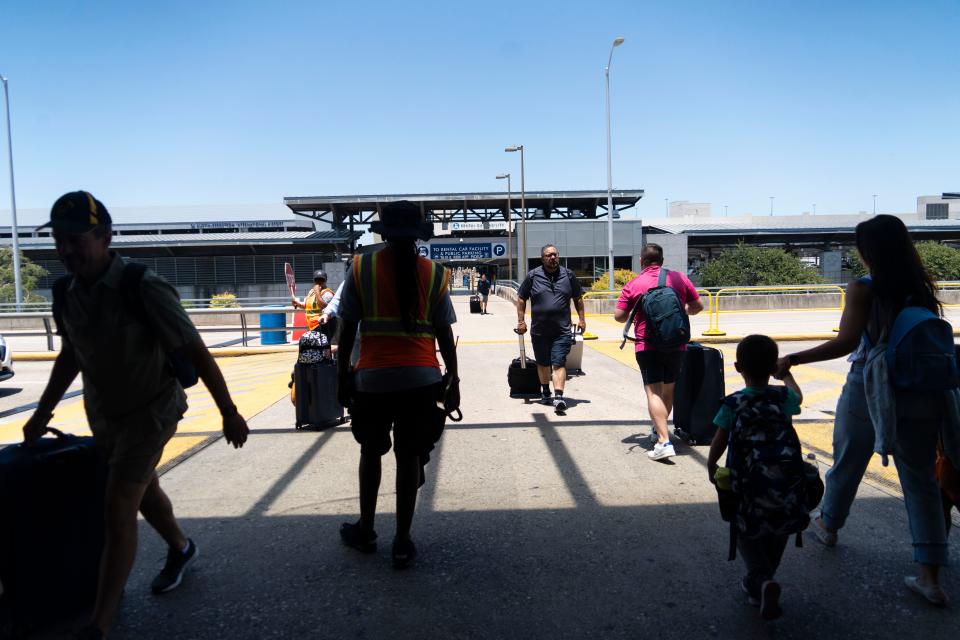Could a partial government shutdown impact Texas airports? Here's what to expect
With the U.S. Congress gridlocked and staring down a Sept. 30 deadline to fund the federal government, aviation officials across Texas are preparing for the possible implications of a partial government shutdown on the state's airports.
Any impacts may not be apparent on the surface, as Austin airport officials project there will be no substantial changes for passengers flying in or out of Austin-Bergstrom International Airport. While some federal agencies temporarily shutter during shutdowns, the majority of federal aviation officials — those with the Transportation Security Administration, Federal Aviation Administration and U.S. Customs and Border Protection — fall under "essential services," meaning their employees will continue working, without pay, despite a shutdown.
“AUS does not anticipate significant changes for travelers due to the federal government shutdown. Employees that work in federal roles that are critical to operating the airport are expected to report for duty," Sam Haynes, an airport spokesperson, told the Statesman in a written statement Tuesday.
Federal government shutdown: How you and your community could be affected
Some changes will be administrative in nature, with some paperwork, for example, often calling for signoffs from city officials' federal counterparts, Haynes said.
However, in a Sept. 20 news release, the White House has suggested that FAA air traffic controllers and TSA agents working without pay would lead to "significant delays and longer wait times for travelers at airports across the country like there were during previous shutdowns.”

Could TSA, customs move slower because of the shutdown?
During the 2019 shutdown, many federal airport workers started calling in sick in droves around the two-week mark. At the time, however, TSA said the impact was "minimal," according to the Associated Press.
TSA officials, including transportation security officers and security inspectors, canine handlers, federal air marshals, are required to sustain security operations and will continue to work without pay when there is a lapse in federal funding.
Across the country, since Memorial Day weekend, TSA has screened 2.5 million passengers on average per day, exceeding pre-COVID-19 pandemic travel volumes.
From January to April, on average, more than 55,800 passengers moved through the city-ran Austin airport per day.
What about the air traffic controllers?
Polly Trottenberg, the acting FAA Administrator, has said safety would not be compromised as a result of a shutdown, though the impact would still be felt, particularly in training and contracting.
"We've heard it on every level of our administration — the president, secretary (of transportation) and me particularly. It is going to be challenging for a 24/7 operational agency like the FAA, if there's a shutdown," Trottenberg told reporters on Sept. 13, according to an FAA spokesperson.
Under a shutdown plan for the U.S. Department of Transportation, more than 17,200 of about 45,200 FAA employees across the country would be furloughed. A majority of the employees remaining will work without pay because their duties are "necessary to protect life and property."
Federal leadership has suggested a shutdown would slow efforts to address an ongoing air traffic controller shortage.
Though the FAA has hit its hiring goals for air traffic controllers, hiring more than 6,100 new controllers in the last five years and implementing a new workforce plan in 2022 to hire and retain employees, as many as 2,600 are currently in training. Transportation Secretary Pete Buttigieg said pausing that training process as a result of a government shutdown could be detrimental.
"Even a shutdown lasting a few weeks could set us back by months or more because of how complex that training is," Buttigieg said during a House Transportation and Infrastructure Committee hearing on Sept. 20. "We cannot afford that kind of politically driven disruption at the very moment when we finally have those air traffic control workforce numbers headed in the right direction."
The US currently employs 1,200 fewer fully certified controllers than 10 years ago, according to the National Air Traffic Controller Association.
The Austin airport is aquatically staffed with 42 air traffic control personnel, none of whom are currently in training, according to the 2022 workforce plan.
USA Today reporters Zachary Schermele, Marc Ramirez and Terry Collins contributed to this report.
This article originally appeared on Austin American-Statesman: Austin airport: Could partial government shutdown affect TSA lines?

